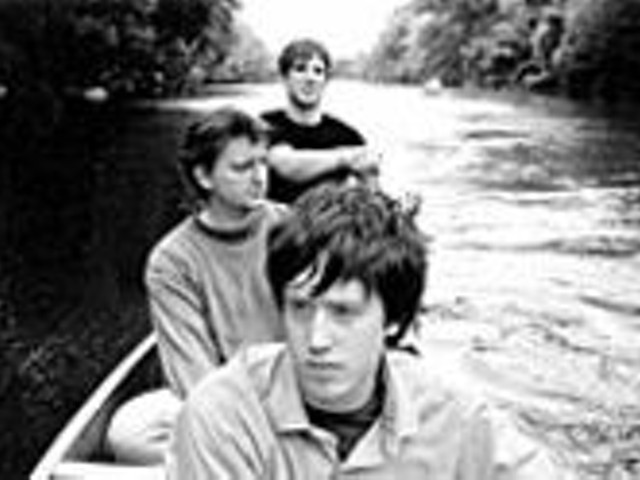Since Gaelic is not widely spoken in St. Louis, you'll hear scant sean-nos performed by local Irish musicians, but Mondays at the City Museum's Cabin Inn the City give an alternative to braving the weekend throng at McGurk's for your traditional Irish-music fix. Every Monday night, your arrival at the Cabin will be greeted by the sounds of harp, fiddle, accordion, uilleann pipes and bodhran (an Irish frame drum) lifting the spirits of patrons with strictly traditional Irish music. The weekly traditional session at the pub is entirely open, so if you play an instrument and know some tunes, you're welcome to sit in. Local guitar legend Tom Hall and musicians visiting from Ireland have appeared, but the cast of players varies from week to week. Constant are the quality of the playing and the warm, informal atmosphere.
The sessions are hosted by harpist Eileen Gannon, fiddler Kevin Buckley, accordionist Kelly Winter, bodhran player Chris Weddle and multi-instrumentalist Tommy Martin, five instructors from St. Louis Irish Arts, an organization responsible for teaching Irish music and dance locally since 1976. With the exception of Martin, all are St. Louis natives.
"Tommy's from Dublin," says Gannon. "[St. Louis] Irish Arts helped him get his visa, so he's working with us. He teaches pipes, fiddle, whistle. He's a real jack-of-all-trades, and he's the real deal."
At the Cabin sessions, this core group's familiarity with one another and shared repertoire give them the appearance of a band, but they've not yet agreed on a name for the alliance.
"We've been playing as a band for quite some time," says Buckley. "We've played in arrangements and done shows as a band, give or take a few people. Recently, when we've played at something, it's been a 'band' for that evening."
"It would be nice to get a name and formally set everything up," adds Weddle.
"We could get together a more performance-based concert, rather than sitting around and saying on the spot, 'Uh, let's play this, okay, now this,'" muses Buckley. "Well, we'll probably continue to do that anyway."
Currently, the musicians seem to place a premium on relaxing from the rigors of work, college and teaching, so they choose to have less formal gigs and sessions. For them, these sessions are more about the craic, -- the simple pleasures of getting together to play music, tipping a pint or two with friends, dancing and having a good time. Actually, this sort of arrangement is faithful to Ireland's traditional pub culture on the outskirts of the larger cities. Musicianship is common to a large percentage of Irish people, and music usually happens when locals get together at the pub. Why ruin a good thing with formalities?
While it's possible to hear more contrived sentimentality and schmaltz in the larger Irish music scenes of other cities, the group feels good about the climate here.
"We don't have too much of that [schmaltz] here," says Buckley. "Every once in a while you go out and hear that crap, but it's not too bad in this city."
"I think some people are tempted to do the less traditional stuff, because it usually goes over better and pays better. You know, like rocked-up Celtic music," says Gannon.
"And the pub songs and the ballads," adds Buckley. "There's nothing wrong with that stuff, but it gets more attention and money than the traditional music."
Who needs attention and money when you're having a good time with friends? At any rate, the warmth and spontaneity of the Cabin sessions are enough to cause most to forget such things, at least for a few hours. On a recent Monday night, a circle of no less than nine musicians occupied half of the tiny pub. Sad and merry melodies wafted in and out as the musicians took turns picking songs simply by playing the opening notes; as the rest caught on to what tune was being played, each measure took on another instrument until everyone who had the tune was playing. A manic jig electrified patrons to the point of stomping with the beat. When it subsided, Gannon began a stately mid-tempo reel that recalled Ireland's most revered composer, the blind harpist Toirdhealbhach Cearbhalláin, plucking a tune in a dark, seventeenth-century public house. A public house, warm and intimate, is what the Cabin felt like. Shortly after last call, when the tunes stopped coming and the musicians began packing their gear, a radiant bliss continued to fill the bar. The musical reminder of earlier years, of safety and innocence lost, had impacted us all.





